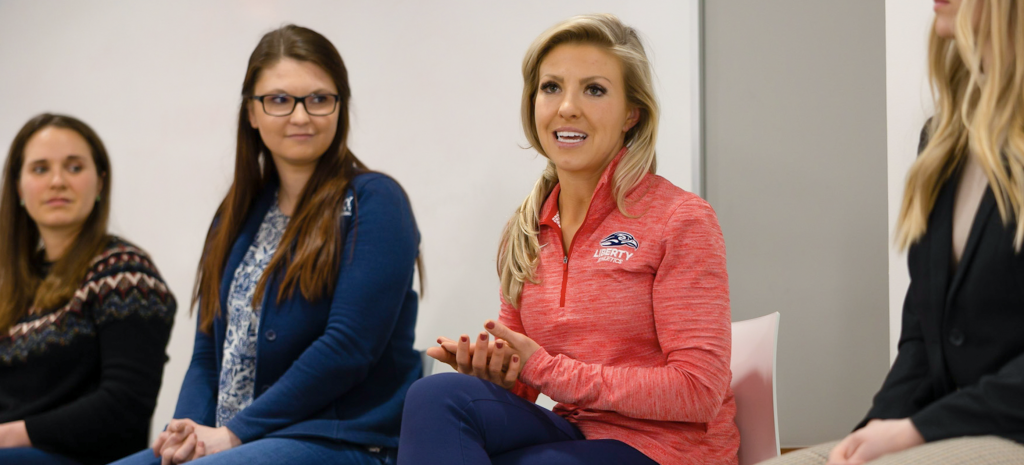Anorexia nervosa, bulimia nervosa and binge eating disorder are just a few of the eating disorders many have struggled with. While 30 million Americans suffer from eating disorders, 95% are between the ages of 12 and 25, according to Johns Hopkins All Children’s Hospital website.
All genders, races and ethnic groups are impacted.
Liberty University joined schools across the nation in raising awareness about eating disorders by hosting a panel of professionals in the Starbucks Lounge on Feb. 24.
The panel, arranged by the Student Health and Wellness Center, occurs annually during National Eating Disorders Awareness Week. This year, the event opened its doors to attendees both in person and online through a Facebook livestream. Facilitated by Executive Director of Student Health and Wellness Keith Anderson, the panel consisted of several experts with experience and knowledge regarding eating disorders.
“Eating disorders are, I think it’s safe to say, the number one issue coming into our office right now,” Liberty Student Counseling Services eating disorder specialist Emily Budowanec said.
Budowanec, one of the panelists, joined registered dietitians Rachel Sanders and Laura Thomas, personal training manager Britta Solle, resident counselor at Living Water Counseling Center Michelle Kauffman and LU Shepherd’s Office Director Tim Griffin in the discussion. With the variety of backgrounds among the panelists, topics covered the spiritual, physical and emotional elements of eating disorders.
“This is a complicated issue, and you never take a complex problem and apply a simple solution to it,” Anderson said. “The whole approach is dynamic, and whatever part speaks to that person, start with
that string.”
For students battling an eating disorder, awareness is one of the most important steps to finding help. This panel helped remind students they are not alone and that there are several resources equipped to help them recover. Hope Hookman, a junior who attended the panel, knows firsthand how important events like these are for Liberty students.
“I think that a lot of people who struggle with this, at least in the beginning, feel like they’re really the only one,” Hookman said. “I know I felt like that, and I think it’s important to normalize it.”
Part of the discussion also revolved around student athletes who are at an increased risk of eating disorders due to the pressures placed on them. Kauffman, a former student athlete, shared her struggle with anorexia and her experience with the recovery process to give a personal insight into the topic. Thomas, who works with athletes on their nutrition, also placed extra emphasis on student athletes and the necessity of eating disorder awareness.
“Not only are you guys athletes, but you’re also humans, and with that … said, you’re wonderfully and beautifully created by the Lord,” Thomas said. “You’ve got to take care of you, you got to take care and get enough food for yourself — not just to perform but to be human and to live your life and to take in the world around you.”
In her closing remarks, Budowanec shared an important analogy with the audience. She described how lots of people, especially women, focus obsessively on the size of their pants and stress when their pants no longer fit. In their obsession, they often attempt to lose weight or change their body, but she explained the harmfulness of this thinking by comparing it to a hair tie.
“We would never shave our head if our hair tie wasn’t big enough for how thick our hair is,” Budowanec said. “We would never get rid of something.”
However, despite the analogy’s relevance to women, panelists reminded attendees that eating disorders can affect anyone.
“Eating disorders do not discriminate based on gender, race, culture, older, younger, you name it,” Thomas said. “It can impact so many individuals, and it doesn’t have a look; it doesn’t have a type.”
Signs of an eating disorder include stressing over food, exercising excessively, extreme weight loss and other food-related symptoms.
For many people, taking the first step is the most difficult part, but Liberty University has many resources available to help students in need. A recording of the panel is located on the @LibertyUHealthandWellness Facebook page for those interested in watching.
Students struggling with an eating disorder can reach out to Liberty Counseling Services in Green Hall for support. Their walk-in hours are 9 a.m. to 3 p.m. on Monday, Tuesday and Thursday and 12 to 3 p.m. on Wednesday and Friday.
Kamman is a news reporter.
